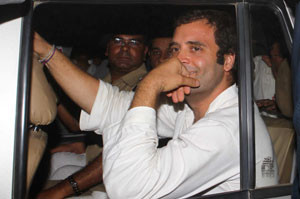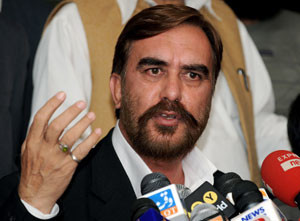Letter from India: Winds of Change
By Sujoy Dhar | News & Politics | Published 14 years ago
 The hot seat of prime minister is being kept warm and well-cushioned for Rahul Gandhi by the Gandhi family loyalist, Prime Minister Manmohan Singh. The buzz around Rahul Gandhi is not about “Will he, won’t he,” like it was with Sonia Gandhi for years till Madam herself put to rest the billion-people speculation and the opposition furore over her Italian origin by choosing the soft-spoken economist to rule on the Congress first family’s behalf. It’s more about when he will take over as the prime minister.
The hot seat of prime minister is being kept warm and well-cushioned for Rahul Gandhi by the Gandhi family loyalist, Prime Minister Manmohan Singh. The buzz around Rahul Gandhi is not about “Will he, won’t he,” like it was with Sonia Gandhi for years till Madam herself put to rest the billion-people speculation and the opposition furore over her Italian origin by choosing the soft-spoken economist to rule on the Congress first family’s behalf. It’s more about when he will take over as the prime minister.
It is a fait accompli that barring unforeseen circumstances, Rahul Gandhi will be the prime minister of India whenever the Congress is in power in New Delhi. No one, not even the Hindu nationalist opposition Bharatiya Janata Party (BJP), disputes it now. He is the heir to the Gandhi-Nehru clan and in true South Asian tradition of dynastic rule, he will be coronated whenever he wishes. Lest anyone forgets, the Gandhi family loyalists in Congress and a section of the media are there to remind everyone that Rahul was born with the ruler’s insignia on his forehead. The Gandhi family is the dignified homepage of the Congress portal, crisscrossed by a myriad leaders of different ideologies, communities and cultural origins. Many of these leaders are at loggerheads with one another. But they fall in line when the Gandhi clan plays the pipe. Congress without a Gandhi is Mumbai without Bollywood.
Interestingly, Rahul Gandhi himself has always evaded the question on his final enthronement as the PM. Painted as the poster boy of Congress by the media, Rahul has always conducted himself with utmost dignity. In fact, many Indian leaders pointing fingers at the dynastic rule of the Gandhis have failed to conduct themselves with as much propriety in the public domain as Rahul or Sonia have.
My readers in Pakistan must be wondering why we are discussing Gandhi now. It is not because he turned 41 last month, or that a senior party leader and Gandhi loyalist, Digvijay Singh, reminded us once again that Rahul is now mature enough to take charge. It is because he, for the first time, decided to check out the rough and tumble of politics in a hotspot.
On the outskirts of New Delhi is Noida, which falls under Uttar Pradesh state, and further down is Greater Noida, where there are many villages inhabited by farmers. While Noida is witnessing furious urban expansion, Greater Noida is still inhabited by farmers. When violence broke out over acquisition of land from the farmers by the state government of Chief Minister Mayawati (the woman leader who heads a lower caste party) in May this year, Rahul Gandhi chose to visit the ground zero of agitation. Evading the eyes of the policemen deployed by the chief minister to prevent the entry of any politician, Rahul Gandhi was the first politician from the opposition to reach out to the farmers. He scored some brownie points with his pillion-riding act to reach Bhatta Parsaul village where clashes claimed four lives, including that of two policemen. Rahul spent an entire day with the farmers and later was even briefly arrested by the state police. The national media followed him and he was all over TV and the newspapers as the high drama unfolded.
But it was weeks later that the Gandhi scion goofed up when he alleged, in a brief media appearance, that many women were raped and farmers killed and buried in the villages. His uncorroborated remark — after setting up a meeting of the farmers and the prime minister — sent the media rushing to the spot to verify the allegations. But even the media that patronises Congress could not come up with anything worthwhile to support the claims, which ranged from rape of several women to “74 (mounds of) ashes there with dead bodies inside” and “pictures” to prove it. The usual, “he was misquoted and he was only articulating what the farmers said,” followed from the Congress leaders, but that did not help much either. A National Women Rights Commission team that had previously visited the area came to the rescue of the Congress leader when it said women were paraded naked, but even that was later disputed by the National Human Rights Commission (NHRC). So Gandhi lost the points he had initially scored with the adventurous pillion-ride to the spot.
It is unfair to judge Rahul Gandhi on the basis of just one incident, but in recent times this has been the only time he took a stand, a pro-farmer one, to win back support in the Hindi heartland state.
Strangely, Rahul Gandhi, with his policy of maintaining silence on sensitive issues, has not voiced his opinion on the various debates that rage in India. He has not voiced an opinion on Pakistan, on terrorism, on India-US relations, on the Maoist challenge, on untouchability, on corruption or even the raging Lokpal Bill (anti-corruption citizen ombudsman) controversy that divides the ruling government and the civil society protagonists. He travels extensively within the country, often by public transport and local trains, but no one knows what the outcome of those trips are. Rahul attacks his political rivals during election campaigns, drawing stinging reactions — which is proof of his importance in Indian politics — but he steers clear of controversy. Even if it is assumed that whatever policy or stance the Congress adopts on various issues has the sanction of the Gandhis, his own cocooned existence is intriguing. Perhaps he wants to begin with a clean slate of no preconceived notions when he does indeed become the prime minister of India.
According to a recent survey by the website Lens on News, a large number of respondents (45%) feel Gandhi will be a better PM than Manmohan Singh (34%). But with no real input from Rahul Gandhi, it is premature to speculate on how good a prime minister he will make.
Chemical Castration for Rapists?
Eight rapes, including the murder of some of the victims, took place in 48 hours in India’s heartland state of Uttar Pradesh. As I wrote this column, I saw two more rapes being reported from the same state, while a nine-year-old missing girl’s body was found in a box near Mumbai. Police suspect she was raped and killed.
A debate was sparked off when a lower court in Delhi suggested, “The government should explore the possibility of awarding punishment in the form of surgical or chemical castration in rape cases.” The judge, a woman, was sentencing a man who had raped his minor step-daughter for over four years.
I first heard the word castration in a forgettable Bollywood movie of the late 1980s, Zakhmi Aurat, starring Dimple Kapadia. Dimple plays a police officer in the film, who is gang-raped and she avenges it by castrating the offenders one by one. Not many may remember this Bollywood movie.
I heard an interesting panel discussion on the subject on NDTV this week where the usual panelists of the channel voiced their opinions which, as expected, were fractured with one section predictably arguing whether we were heading for a Taliban-style justice system. Interestingly, Renuka Chowdhury, a Congress woman leader and former minister with some strong opinions, supported the idea. The openness with which a hitherto taboo subject was discussed was a sure sign of progress. Usually, anything to do with sex is dealt with in veiled, suggestive tones in the public domain. Our toilets, elevators and even historical monuments may be inscribed with graphic details of female sex organs, sketches and outpourings of male perverts, but the sickness of those minds is never debated. But here, I heard mainstream politicians and activists discussing something real, with candour.
But can chemical castration act as a deterrent to rape? Or can a death sentence, as mooted by some, be the ultimate deterrent?
Many of us are not aware of chemical castration. There are plenty of definitions on the Internet, but in a nutshell it is the administration of medication to reduce libido so that sex offenders do not repeat the act. It is not surgical and hence the testicles or ovaries are not removed, and it is also reversible with the discontinuance of the treatment.
In the West, according to a report in The Guardian, “It has been a dream of many doctors, police and prison officers — not to mention home secretaries — to find a magic pill that would stop paedophiles re-offending, particularly because some of them beg for help in controlling their sexual urges.”
The debate can continue in India (a country with a high incidence of rapes) over a law to chemically castrate rapists or other sex offenders. But can chemical castration bring a chemical change in the cultural mindsets that trigger rape as much as the libidos? If women in Mumbai are more secure than those in Delhi during the night, does it have to do with the culture of a region that takes shape over a period of time?
In our countries, there have been open campaigns for condom use to prevent HIV and other venereal diseases, but there has not been any move to educate or sensitise young people in schools, colleges or villages about rape. No attempt has been made to make people aware of the trauma of one single act of forced sex. Some of the sex offenders do not even realise the seriousness of their crime, nor are they aware of the existing punishment of seven years imprisonment in India.
It is time a new set of deterrents are incorporated in law, along with creating awareness on the issue.
 Non-state Actor
Non-state Actor
In Indo-Pakistan diplomatic parlance and during media-slanging matches over terrorism, we have heard the word ‘non-state actors’ being mentioned many times. Pakistan has often argued that it were the non-state actors who were responsible for incidents like the Mumbai attack. India hit back with the US court trials where 26/11 collaborator David Coleman Headley named the ISI.
This June, Indian TV audiences saw a non-state actor of a different kind — one who had some Indian families praying for him and for Pakistan, and showering praise on its people.
Pakistani human rights campaigner Syed Ansar Ahmed Burney, chairman and founder of the Ansar Burney Trust, brought smiles back on the faces of the families of six Indian sailors, who were freed from the clutches of Somali pirates. The six families felt they were let down by the Indian government – which calls for a long-term global action to fight the problem of piracy – but were all praise for Burney and Pakistan.
The entire episode is reflective of what people-to-people bonding across the border can achieve.
Let the diplomats engage in talks, let the politicians adopt carrot-and-stick policies, but let the goodwill among the people of the two countries flourish through souls like Ansar Burney and their humanitarian acts. Humanity knows no borders. The feeling of goodwill that Burney helped spread in India will only strengthen a serious dialogue between the two nations destined by history and an unsavoury past to fight a debilitating battle of nerves.


